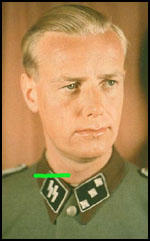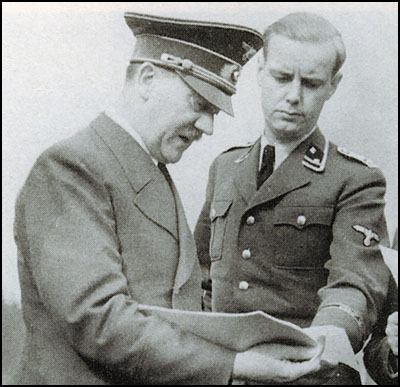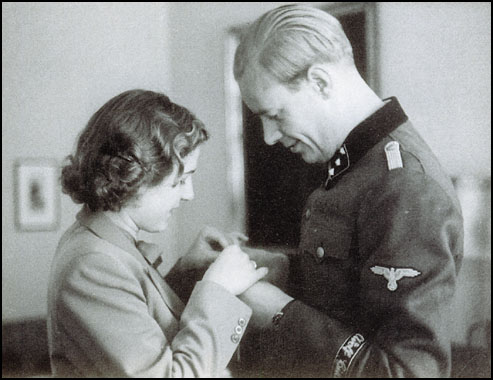Hans Junge

Hans Hermann Junge was born in Holstein on 11th February, 1914. After leaving school he worked in an office. He joined the Schutzstaffel (SS) in 1933. He became a member of the Leibstandarte SS Adolf Hitler (LSSAH), and in 1940 he joined Hitler's household staff as his valet where he served alongside Heinz Linge.
However, as Traudl Humps, Hitler's secretary, pointed out: "To say valet doesn't really cover it - the post was more like that of household manager, travelling companion, butler and maid-of-all-work combined. The valet on duty had to wake Hitler in the morning, that is to say knock at his bedroom door, announce the precise time, and give him the morning news. He also had to decide on the menu for the day, fix mealtimes, pass instructions on to the kitchen, and serve the Führer when he ate. He was in charge of a whole staff of orderlies who looked after Hitler's wardrobe and had to clean the rooms and run the establishment, and he made appointments with the dentist and barber and supervised the care of the dog."
Humps began a relationship with Junge. In her autobiography, To The Last Hour: Hitler's Last Secretary (2002), she pointed out: "By now it was no secret in our close-knit circle that I was on particularly friendly terms with Hans Junge. If I excused myself from a meal it was usually when Linge was on duty, so that Hans Junge and I could take long walks in the mountains together, or go on expeditions to Berchtesgaden or Salzburg. But not only was Julius Schaub as naturally nosy as a washerwoman, he was always on the look-out for subjects of conversation to serve up to the Führer at breakfast. However, while gossip about little love affairs might be very interesting, that wasn't really what the Supreme Commander wanted."

Junge and Humps decided to get married. Humps explained that one of the reasons for their proposed wedding was to persuade Adolf Hitler to give permission for Hans Junge to fight on the front-line: "Hans Junge was a particular favourite of the Führer's, serving him devotedly and with a strong sense of duty. All the same, he was anxious to get further away from Hitler. He was one of the few people to realize that in the long run Hitler's ideas would have such an effect on you that in the end you wouldn't know what you had thought of yourself, and what was due to outside influence. Junge wanted his sense of objectivity back. He had applied several times to go to the front, which was the only way he could give up his job with Hitler. Every time his request was turned down on the grounds that he was indispensable; there were plenty of good soldiers but few trustworthy valets and adjutants."

Hitler agreed that the couple could marry: "Well, I certainly do have bad luck with my staff. First Christian marries Data and takes my best secretary away, then I finally get a really good replacement, and now Traudl Humps is leaving me too and taking my best valet with her into the bargain." Hitler then said to Humps:"But you'll be staying with me for the time being. Junge insists that he wants to go to the front, and while you're on your own you can carry on working for me."
As Junge was a member of the Schutzstaffel (SS), Humps had to fill in some paperwork: "The wedding was fixed for the middle of June 1943. I rebelled only once, when I saw the mountain of forms and questionnaires I must fill in because I was going to marry an SS man. I lost my temper and told my future husband that I'd throw the whole lot in the wastepaper basket if my marriage depended on this kind of thing. Hitler laughed heartily when I read him out some of the questions on the forms. For instance, they asked, 'Is the bride positively addicted to housework?' He himself said that of course all this was nonsense, and he'd have a word with Himmler about it. Anyway, I was spared having to fight a battle on paper, and before I knew it June came and I was Frau Junge. My married bliss lasted four weeks, while we went on honeymoon to Lake Constance, and then my husband joined the army and I moved back to headquarters."
Hans Junge was killed during a low-flying aircraft attack in Dreux, Normandy on 13th August 1944.
Primary Sources
(1) Traudl Junge, To The Last Hour: Hitler's Last Secretary (2002)
By now it was no secret in our close-knit circle that I was on particularly friendly terms with Hans Junge. If I excused myself from a meal it was usually when Linge was on duty, so that Hans Junge and I could take long walks in the mountains together, or go on expeditions to Berchtesgaden or Salzburg. But not only was Julius Schaub as naturally nosy as a washerwoman, he was always on the look-out for subjects of conversation to serve up to the Führer at breakfast. However, while gossip about little love affairs might be very interesting, that wasn't really what the Supreme Commander wanted. If he heard about such things he recognized only serious, long-term relationships.
Hans Junge was a particular favourite of the Führer's, serving him devotedly and with a strong sense of duty. All the same, he was anxious to get further away from Hitler. He was one of the few people to realize that in the long run Hitler's ideas would have such an effect on you that in the end you wouldn't know what you had thought of yourself, and what was due to outside influence. Junge wanted his sense of objectivity back. He had applied several times to go to the front, which was the only way he could give up his job with Hitler. Every time his request was turned down on the grounds that he was indispensable; there were plenty of good soldiers but few trustworthy valets and adjutants. Finally Junge saw his chance in getting engaged to me. He knew very well that Hitler was as unwilling to lose me as his secretary as he was to lose Hans as his valet. And an engagement wasn't too firm a tie, but would give us the chance to spend time together and get to know each other. So we both decided to tell the Führer we were engaged, and at the same time Junge would ask for a transfer to the front again.
Schaub was delighted when we asked him to tell the Führer about our intentions. Soon after Hitler's birthday, he took his master this world-shattering news. I found the whole thing terribly embarrassing. I could feel Hitler's eyes resting on me with a surreptitious smile at table, I thought I saw faces full of sly glee around me, and I felt like getting up and running away. I remembered, with a rather guilty conscience, saying with heartfelt conviction only three months earlier that I took no interest in men.
That evening by the fireside Hitler suddenly said, "Well, I certainly do have bad luck with my staff. First Christian marries Data and takes my best secretary away, then I finally get a really good replacement, and now Traudl Humps is leaving me too and taking my best valet with her into the bargain." Then he turned to me. "But you'll be staying with me for the time being. Junge insists that he wants to go to the front, and while you're on your own you can carry on working for me." So now I was suddenly engaged, although I didn't really feel quite up to this new dignity. However, I thought confidently, who knows what may happen between engagement and marriage?
(2) Traudl Junge, To The Last Hour: Hitler's Last Secretary (2002)
When I turned up at the Berghof again two days later, Hans Junge too had been told that we should get married at once. He couldn't think of any particularly good reason against Hitler's persuasions either, and anyway I believe at heart he rather liked the idea. Finally I came to terms with it too, and the wedding was fixed for the middle of June 1943. I rebelled only once, when I saw the mountain of forms and questionnaires I must fill in because I was going to marry an SS man. I lost my temper and told my future husband that I'd throw the whole lot in the wastepaper basket if my marriage depended on this kind of thing.
Hitler laughed heartily when I read him out some of the questions on the forms. For instance, they asked, `Is the bride positively addicted to housework?' He himself said that of course all this was nonsense, and he'd have a word with Himmler about it. Anyway, I was spared having to fight a battle on paper, and before I knew it June came and I was Frau Junge. My married bliss lasted four weeks, while we went on honeymoon to Lake Constance, and then my husband joined the army and I moved back to headquarters.
(3) Traudl Junge, To The Last Hour: Hitler's Last Secretary (2002)
We were sitting together at lunch again; this was the end of August 1944. Hitler's manner to me was very strange. He seemed almost unfriendly. He never said a word to me all through the meal, and when I happened to meet his eyes by chance they bent a serious, questioning gaze on me.
I couldn't imagine what I might have done or how I could have annoyed him. I didn't worry about it any further, and thought he was probably just in a bad mood.
That same day Hermann Fegelein (Liaison officer of the Waffen SS) phoned me. "Can I come and have coffee with you this afternoon?" he asked. I wondered why he suddenly wanted to come and see me, he'd never done that before, but I said yes. Coffee time came and went but Fegelein didn't turn up. Finally the phone rang again. He said the briefing had gone on a long time and now he had to get some work done, but could I just drop in on him for a moment? All right, I thought, I might as well take my dog for a walk, and I set off for Fegelein's new hut, the last building in the headquarters complex. Fegelein greeted me.
"Hello, nice of you to come, would you like a schnapps?' Goodness me, I thought, what's he after? I'd assumed he had something he wanted to discuss with me. "No," I said, "I don't want a schnapps at the moment, but you were going to come and have coffee with me, weren't you? What's up? I mean, why are you doing me this honour although you know I'm faithful to my husband?" Then he came over to me, put his arms round me in a paternal way and said, "I'd better tell you straight out. Your husband has fallen." The Führer has known since yesterday, but he wanted to wait for confirmation, and then he found he couldn't tell you himself. If you're in any kind of trouble come and see me, I'll always help you." With these words he let me go and poured me a schnapps after all, and now I did drink it. For the moment I couldn't think at all, and Fegelein gave me no time for it. He went on talking, and as if from a great distance I heard him saving what "a terrible mess", everything was, this war and the Bolshevists and absolutely everything, but one day it would all be different... Funny how I still remember that, although I was hardly listening to him.
Suddenly I was out in the open air again. Warm summer rain was falling very gently, and I walked on down the road, out of the camp and over the fresh green meadows, and it was very quiet and lonely. I felt very much alone, and it was all so terribly sad. I got back to my room late. I didn't want to see or hear anyone. I wasn't anxious to hear any condolences and sympathy. Then a call came from the Führer's bunker. "Are you coming to dinner today, Frau Junge?" I said, "No, I won't be there at dinner today." The orderly hung up. But the phone rang again. This time Linge himself was on the line. He said, "The Führer would like a quick word with you all the same, so come on over even if you don't stay for dinner." Finally I thought well, the sooner the better, and then I'll have it behind me.
I was taken into the little room that had once been Fraulein Schroeder's living room. Now it was a temporary study for Hitler. How gloomy and sober the room looked now. Once Linge had closed the door behind me Hitler came towards me without a word. He took both my hands and said, "Oh, child, I'm so sorry. Your husband was a splendid fellow." His voice was very soft and sad. I almost felt sorrier for Hitler than for myself, because it's so difficult to express sympathy. "You must stay with me, and don't worry, I'll always be there to help you!" Suddenly everyone wanted to help me, and I felt like running away.
